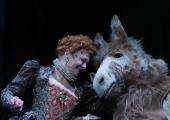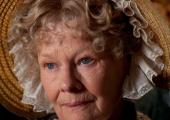Bah Humbug: Judi Dench - the greatest stage actor ever?

Does the stage and screen actress really deserve such an overblown accolade?
Seems we’re living through a silly season. There are rumours afoot that our PM’s Big Society is nothing other than a fig leaf for a chaos theory of how to run society, ie let the devil take the hindmost. And in the arts we’ve got theatre’s esteemed trade paper declaring, in a much-publicised puff - organised through a star-studded panel of the Great and the Good and “hundreds of readers voting from a list of 10 actors” - that Dame Judi Dench is The Greatest Stage Actor of all time.
Well, good on The Stage. Nothing like stirring up debate to draw attention to yourself, and heaven knows live theatre needs all the attention it can get in an age where 20 million prefer staying in to watch The X Factor than trudging through snow and ice to confront a spluttering transport system.
In any case, it's hardly a stage secret that Dame “Dudi” is possibly the most popular stage actor of our time. I don’t think you’d have to put it out to your nearest focus group to establish that. Dame Dudi has proved herself gloriously impervious to age, enjoying a late-flowering Indian summer of a career. But “of all time”? Give me a break.
 Are we including 19th-century actors here? Do any of our glittering panel who drew up the nominations remember seeing Sarah Bernhardt on stage? If so, they’re being awfully discreet about their ages. How about the likes of Edmund Kean (pictured right, as Sir Giles Overreach) of whom Coleridge wrote: “Seeing him act was like reading Shakespeare by flashes of lightning”? Are we really seriously comparing Dame Dudi’s undoubted luminous qualities with past glories who, it seems, have slipped delicately from view?
Are we including 19th-century actors here? Do any of our glittering panel who drew up the nominations remember seeing Sarah Bernhardt on stage? If so, they’re being awfully discreet about their ages. How about the likes of Edmund Kean (pictured right, as Sir Giles Overreach) of whom Coleridge wrote: “Seeing him act was like reading Shakespeare by flashes of lightning”? Are we really seriously comparing Dame Dudi’s undoubted luminous qualities with past glories who, it seems, have slipped delicately from view?
The point is even more forcibly made if we look at the illustrious list from which Dench was plucked: Maggie Smith, Mark Rylance, Ian McKellen, Laurence Olivier, Paul Scofield, John Gielgud, Michael Gambon, Vanessa Redgrave, Ralph Richardson. The sharp-eyed may notice a certain communality between them. All, even those no longer with us, have been prominent in the last 40 years of the 20th century. Some – Gielgud, Richardson – started to make their mark even earlier, in the Thirties and early Forties.
 But there’s a strange amnesia/myopia at work here. Of Dame Peggy Ashcroft (pictured left in A Passage to India), who died in 1991 and who was regarded in her lifetime as one of the jewels in the British theatrical crown alongside Olivier and his esteemed contemporaries, there is no mention.
But there’s a strange amnesia/myopia at work here. Of Dame Peggy Ashcroft (pictured left in A Passage to India), who died in 1991 and who was regarded in her lifetime as one of the jewels in the British theatrical crown alongside Olivier and his esteemed contemporaries, there is no mention.
Ashcroft’s range, covering leading Shakespearean roles such as Rosalind (As You Like It), Portia (The Merchant of Venice), Imogen (Cymbeline), Cleopatra and, indelibly, Queen Margaret in Peter Hall’s towering 1964 Wars of the Roses - not to mention roles in Chekhov and Ibsen and a landmark Hester in Terence Rattigan’s The Deep Blue Sea - must surely equal that of Dench’s.
 Irene Worth (pictured right in a production of Beckett's Happy Days), another peerless actor of majestic subtlety and variety and one of Peter Brook’s favourites, is also overlooked. The still under-rated Michael Redgrave (Vanessa’s dad), Sybil Thorndike, Ian Richardson, Ian Holm and Donald Wolfit might also nudge themselves into my list. And whatever happened to international stars such as Madeleine Renaud, Jean-Louis Barrault, Maximillian Schell, Anna Magnani or the great Greek actress Irene Papas?
Irene Worth (pictured right in a production of Beckett's Happy Days), another peerless actor of majestic subtlety and variety and one of Peter Brook’s favourites, is also overlooked. The still under-rated Michael Redgrave (Vanessa’s dad), Sybil Thorndike, Ian Richardson, Ian Holm and Donald Wolfit might also nudge themselves into my list. And whatever happened to international stars such as Madeleine Renaud, Jean-Louis Barrault, Maximillian Schell, Anna Magnani or the great Greek actress Irene Papas?
Granted, neither the panel nor the readers of The Stage possess Doctor Who's powers to travel back in time. Nor, it seems, travel abroad. What we have here really is a nonsense, albeit a festive one to lighten the gloom as we approach the winter solstice and the shortest day. Nonetheless it begs some serious questions. The alarmingly parochial picture that emerges shows how incapable we have become of addressing anything beyond our own time frame, or beyond our borders. We are indeed an island race, our little world surrounded by a sea (to corrupt Shakespeare).
Given the high quality (and status) of the panel of theatre luminaries who compiled the nominations - former National Theatre boss Sir Richard Eyre (no slouch himself when it comes to ruminative judgements), Nica Burns, the shrewd West End theatre owner, producer and president of SOLT (the Society of London Theatres), legendary international theatre producer Thelma Holt and Vicky Featherstone, the young, visionary artistic director of the peripatetic National Theatre of Scotland - I have to ask myself why nobody thought to rein in the “of all time” tag. The hyperbole simply renders the whole premise laughable.
 Maybe this was intentional; a holiday jest, no more, no less. But let us not forget that theatre is quintessentially – at least in word-locked England - about text: words are gold dust. One of the undoubted glories of Judi Dench has been her exquisite delivery of Shakespeare. Her account of Titania’s speech about the natural disasters provoked by the fairy queen's schism with Oberon in A Midsummer Night’s Dream (pictured left in the acclaimed1962 RSC production) remains a touchstone for our time - for our time being the salient point.
Maybe this was intentional; a holiday jest, no more, no less. But let us not forget that theatre is quintessentially – at least in word-locked England - about text: words are gold dust. One of the undoubted glories of Judi Dench has been her exquisite delivery of Shakespeare. Her account of Titania’s speech about the natural disasters provoked by the fairy queen's schism with Oberon in A Midsummer Night’s Dream (pictured left in the acclaimed1962 RSC production) remains a touchstone for our time - for our time being the salient point.
By all means dub her one of our greatest stage actors alongside Peggy Ashcroft, Paul Scofield, Maggie Smith, Laurence Olivier and the rest. Just don’t insult our intelligence. And don’t demean the actors who have gone before but who happen to have fallen out of eye and ear-shot of the fickle, or just those who have little historical perspective to draw upon.
- Who would be your Top 10 favourite stage actors – and what would be your criteria for choosing them?
- Must you have seen them physically on stage?
- Should there be a cut-off date?
Answers on a postcard or to: theartsdesk.com
OVERLEAF: MORE DENCH ON THEARTSDESK


